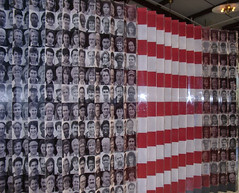The Immigrant Experience
“Remember, remember always, that all of us, and you and I especially, are descended from immigrants and revolutionists.”I have just finished reading The Namesake by Jhumpa Lahiri. One of the things I kept thinking about as I read the book was "the immigrant experience." The Namesake is the story of one young man, son of a Bengali couple who immigrated to Massachusetts in the 60s. He's born in 1968 and we jump through his next thirty years of growing and wrestling with both his heritage and his Americanism. At the same time we see his parents and their friends clinging stubbornly to their old ways from India. They make few friends outside the Bengali community and can't quite get the hang of what this American Immigrant experience is supposed to be.
― Franklin D. Roosevelt
 |
| Flag of faces, Ellis Island |
Or there was my mother's parents, refugees from Russia in the early 20th Century, escaping the pogroms that were far more brutal than portrayed in Fiddler on the Roof. They landed in New York City and built a new life, a free life, surrounded by other Russian Jews. This extended to the point where I once heard that my mother, born in Brooklyn in 1913, spoke Yiddish and didn't learn English until she went to school.
With all this talk we have been having about immigration reform, "illegal" immigrants, etc. and the huge firestorm it engenders, it might be good for all of us to pause and consider what the immigrant experience was like for our ancestors, how they were treated by the ones who came before, and then seek to keep that from happening. And I'm not even suggesting we ask the earliest inhabitants to the land what they might have felt when the Europeans showed up.
This is a nation of immigrants. We are not a melting pot in the sense that all of us end up as a homogeneous group. We maintain a great deal of our heritage, but in the end we are more and more that mixture of many ethnic and cultural stories that merge into a beautiful tapestry, a kaleidoscope that we can call the United States.


No comments:
Post a Comment